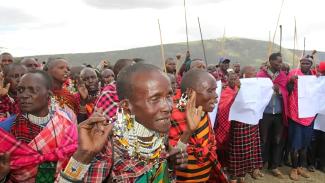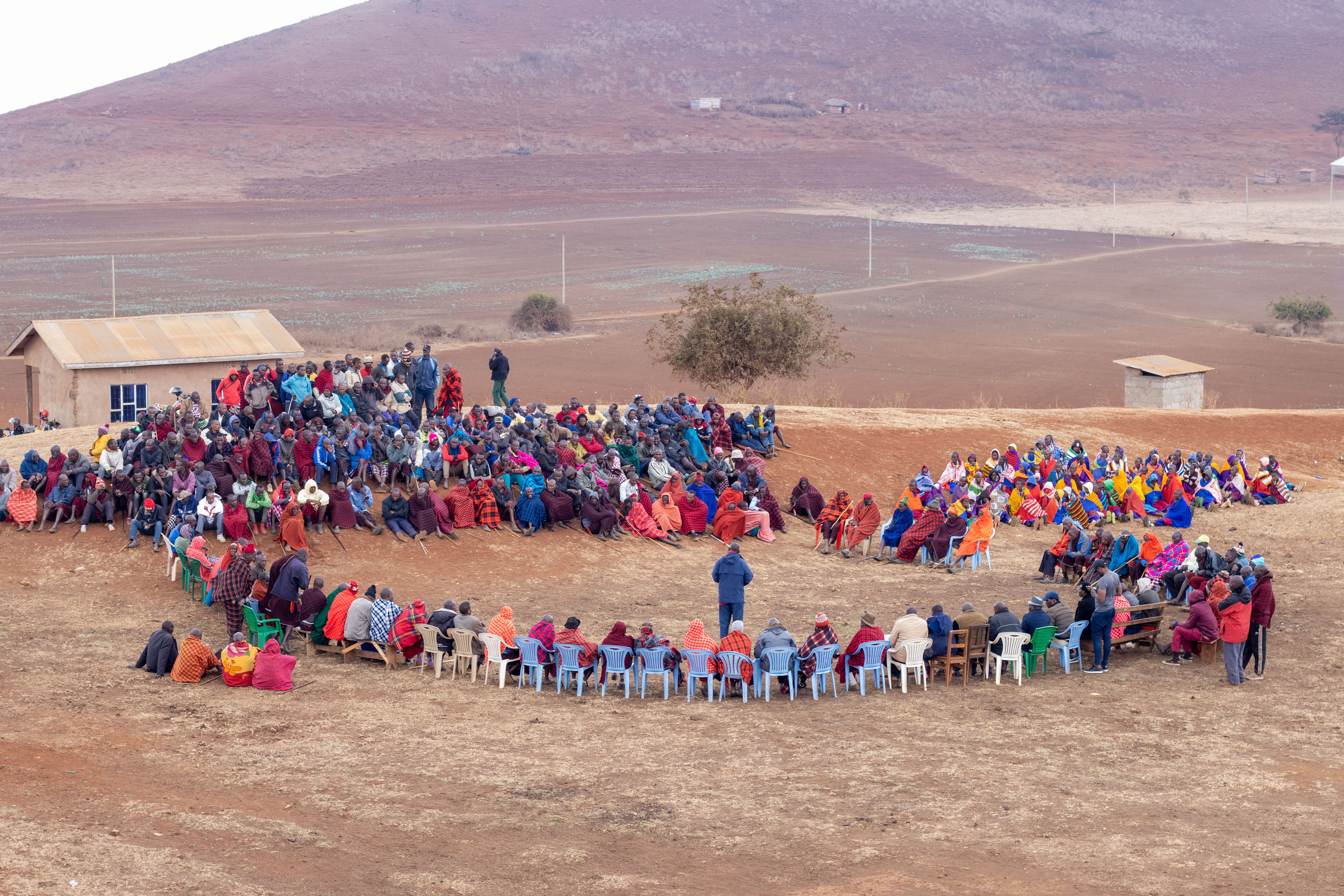
In 2017, the Tanzanian government ordered the Massai communities of Ololosokwan, Oloirien, Kirtalo, and Arash to move from their traditional territories. The land, which comprises 580 square miles adjoining the Serengeti National Park, has been a target of dispute between the communities who hold land ownership titles and the government. According to Human Rights Watch, the Tanzanian government has forcibly evicted thousands of Maasai in the Loliondo area since 2009. The government claims that the purpose of annexing the disputed lands into the wildlife reserve is to optimize its conservation efforts. However, it has been revealed that the government intends to lease this Maasai ancestral land to a UAE-based company to create a wildlife game reserve for trophy hunting and elite tourism.
The Maasai community filed a lawsuit against the government, claiming that the forceful evictions were unlawful and violent. The communities argue that they farm, graze, and steward their animals on legally registered land, including the disputed 580 square miles, and not on land belonging to the Serengeti National Park, as contended by the government. The East African Court of Justice granted an injunction in 2018 halting the eviction of the Maasai communities on the disputed land while the final judgment is pending.
In October 2022, the court ruled in favor of the Tanzanian government on grounds of lack of sufficient evidence provided by the plaintiffs. An appeal was logged shortly after with the Appellate Division. Cultural Survival recently spoke with Nailejileji Tipap (Maasai), who works with the Pastoralist Indigenous NGO Forum, an organization focused on Indigenous pastoralist and hunter gatherer communities in Tanzania.
CS: Tell us about the violence that has occurred in your region.
Nailejileji Tipap: Indigenous people have been facing a number of violent attacks caused by the encroachment of their lands due to the expansion of conservation projects such as national parks, game reserves, game control areas, and wildlife management areas. One of the causatives is that Indigenous pastoralists have their own Indigenous land use plan for managing the land. During the wet season we have a method of conserving rangeland so it can be used during the dry season. You can be traveling to their areas and come across big landmasses where no one is living. This land may be bare in the eyes of a person who does not know of Indigenous conservation methods, but mostly this land is grazing land that has been left bare so it can be used during the dry season in accordance with the Indigenous land use plan.
Due to the expansion of new game reserves, the government has been encroaching into this seemingly bare land, sometimes going beyond into village land. A number of human rights violations have followed. In 2022, the government demarcated an area in Loliondo with the purpose of creating the new game control area known as Pololet. This is one of the dry season grazing lands. But now the community is subjected to poverty because they lack access to grazing land and their livestock is confiscated by game rangers.

Community meeting in Loliondo, Tanzania. Photo courtesy of Pastoralist Indigenous NGO Forum.
CS: Please tell us about the court case between the Maasai and the government.
NT: Masaai communities of Tanzania have filed cases in court. Some of them are still pending, and in some we didn’t get the justice that we hoped for. There have been issues that make us as a community doubt some of the court decisions. Some of the statements that our leaders could see and hear suggested that powerful people are allowed to dictate the judiciary proceedings and to sideline justice for Maasai communities. There are cases that are being adjudicated outside of the courts of our country, including the East African Community Court of Justice.
A delay of justice is equivalent to denial of justice, and a number of our cases have been delayed, postponed, and so on. If one looks closely, one can see a trend of how our testimonies have been deemed improper by the court. There has been a trend of the courts not giving the justice we seek in our lawsuits against the Tanzanian government, but I believe that is not enough to stop us as communities from launching lawsuits in pursuit of justice. We will keep fighting inside and outside of the court until we get the justice we as a community deserve, including preparations of evidence of the forceful evictions and letting the truth come out about what is going on in Indigenous Maasai communities in Tanzania.
This injustice goes beyond what is currently happening in Loliondo. There are other places, other Maasai pastoralist land, that are encroaching into and there are many communities that are forceful and unlawful. So this is a very big problem that the Maasai communities are facing across Tanzania.
CS: Has the situation improved? What is the latest?
NT: The situation is getting worse. If you go to a different part of where the Masaai communities or other pastoral communities reside, everywhere there is an outcry. There have been trends of encroachment of the land, of confiscation and of auctioning their livestock, trends of [establishing] game reserves. Game rangers are causing a lot of harm to these communities, weakening their livelihood and economy that the community depends on. It is even weakening the well-being of the communities; if you go to Loliondo, to Simanjiro, Kiteto, Monduli, Longido . . . everybody’s crying. Their land has been encroached in all those parts. I don’t know if the government truly understands how these actions are subjecting people into poverty. If all of this land is conserved under the conditions of protecting them as stated by the government—then we doubt that the conservation efforts are being done in the manner officially not clearly stated—how can we call that conservation if it means killing the livelihood and income of Tanzanian people, of women and children, of Elders who are friendly to the environment and depend on a certain livelihood that does and, in fact, coexist with the environment? They don’t take time to listen to the community, to have conversations with the community.
Government officials just show up, demarcate the land, and simply states; to the people residing there must move out immediately, telling the people that either the land is being included in a conservation or game reserve areas. There is no consultation with the residing communities, and the communities do not understand what is happening to them and their homeland. It has been chaos. If you are introducing conservation efforts onto land already characterized by coexisting modes of living and environmental systems, why use force? Why use threats? Why the need to forcefully evict people? No solution has been brought, only evictions. It has been hard for us as a community.
CS: What is your message to the world regarding this situation?
NT: My key message is that we, Indigenous Peoples, Massai, are not against conservation. We have always encouraged conservation and have dedicated our lives to conservation. In Tanzania, most of the national parks like Serengeti, Gorongoro, Tarangire, Manyara, and others were once open land where Indigenous people have historically passed through. It’s misleading what is being stated to people, that we Indigenous people are destroyers of the environment. That is totally false. Most of our traditional practices, customs, norms and taboos are attached to the environment beyond what we know and what we see. Our ceremonies and other important practices as communities all stem from the environment. This mutual relationship between our communities and nature should not be destroyed because of misleading statements about the Indigenous people living on this land.
The second thing I want to say to the world is this: If we keep encroaching our land and funding the government and its entities to continue doing what they are doing, it will continue to create chaos in our communities and subject more of us to a life in poverty. We will have to start finding solutions for these communities to earn an income for their survival. There is huge pressure to end the livelihood system that also provides an income. We have been custodians of nature for ages. The world should not be misled by the government of who the Maasai people are, or why we as a community are attached to this land.
Top photo: Violence in Loliondo has affected Maasai communities since 2009. Photo courtesy of the Oakland Institute.
